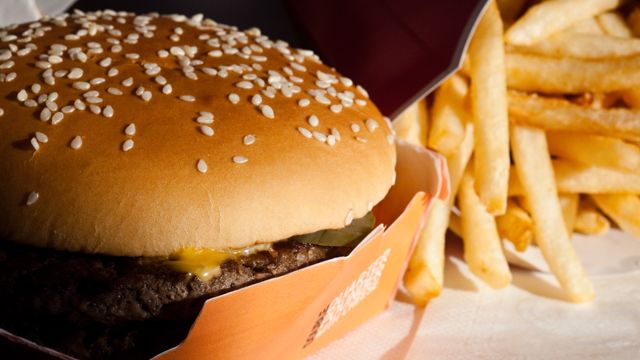This post first appeared in the Brennan Center blog.

In October, the Supreme Court will hear oral arguments in the McCutcheon v. FEC case, which challenges aggregate limits on money that individuals can give every two years in federal elections to all candidates, political parties and PACs, combined. The current limit is $123,200. When they do so, the Justices should remember the price of a Quarter Pounder in the 1970s. And here’s why.
The aggregate limit at issue in McCutcheon was one of the post-Watergate reforms put in place by Congress to discourage corruption and its appearance. With Watergate 40 years in the rear view mirror, it is easy for President Nixon’s campaign finance violations to slip from the collective consciousness.
But as a reminder, Nixon’s successful reelection campaign was remarkable for its receipt of big, secret and illegal campaign contributions. So when Congress clamped down on how much a citizen could give to individual federal candidates and collectively to all federal candidates, the members had the Committee to Reelect the President (also colloquially known as CREEP) firmly in mind.
One concrete example from the Nixon era illustrates the risks that are posed by unlimited contributions from individuals: the price of the Quarter Pounder. The story revolves around Ray Kroc, who, at the time, was the CEO of McDonald’s. Mr. Kroc had a few problems that the federal government could help fix if it were so inclined. Problem one was he wanted the minimum wage dropped for his then-largely teenage workforce. Problem two was he wanted to raise the price of his hamburgers when the Nixon administration had imposed price controls on many consumer goods, including food, in a vain attempt to stave off inflation. Solving these problems would line Mr. Kroc’s pockets.
Mr. Kroc decided to donate over $250,000 in 1972 to CREEP (equal to roughly $1.3 million today) by routing the money through multiple committees. Maurice H. Stans, former secretary of commerce and chief fundraiser for Nixon’s reelection campaign, claimed that Mr. Kroc gave the quarter million out of the pure goodness of his heart and with no requests made of the Nixon administration. Mr. Stans may not be the most credible witness on this point, though, as he later pled guilty to five counts of violating various campaign finance laws while fundraising for Nixon.
What happened after this generous gift of campaign cash from CEO Kroc?
One theory about what the $250,000 bought for McDonald’s was the chance to get a “subminimum” wage for teenagers. According to Eric Schlosser in Fast Food Nation, the minimum wage, which was then $1.60/hour, would have been slashed to $1.28 for teenagers under what became known as the “McDonald’s bill.” But Congress refused to put the subminimum wage into the final bill presented to Nixon for signature. According to contemporaneous reporting by Congressional Quarterly, Nixon vetoed the bill because it lacked the subminimum wage. That’s why People Magazine called it the “McDonald’s Veto.” Even Kroc’s New York Times obituary mentioned the attempt to drop the minimum wage in exchange for campaign cash.
As for the price of a Quarter Pounder? Under President Nixon, price controls were administered by a Cost of Living Council chaired by Treasury Secretary John B. Connolly and a Price Commission. The basic idea was to freeze the price of consumer goods — a rather ironic move towards central control of the American economy from a man fighting the Soviets.
The timing over what happened to the price of the Quarter Pounder was certainly suspicious. In November of 1971, during the period when the general price freeze was in effect, McDonald’s raised its price on its Quarter Pounder with Cheese from 59 cents to 65 centswithout authorization from the Price Commission. In May 1972, the Commission ordered McDonald’s to drop the price back to the original cost in compliance with the general price freeze. Between May and September 1972, Ray Kroc contributed the $250,000 to CREEP. And in September 1972, the Price Commission reversed its decision and granted McDonald’s price increase. The relief was for McDonald’s alone. From the outside it looked like a quid pro quo and critics like Senator Harrison Williams called out the corruption. Mr. Kroc called Senator Williams names I can’t print here.
The lists of things a modern day CEO wants from the federal government are probably different from Ray Kroc’s wish list, but they surely abound. I would wager dollars to donuts that most of us would rather not have a small coterie of big donors calling the shots, regardless of whether the policy question is the minimum wage or the price of a hamburger. I strongly suspect — and poll after poll shows — that most of us would prefer generally applicable laws, not ones that are riddled with loopholes that only benefit big campaign donors. At base, that’s what’s at risk if the over $123,000 cap on contributions is lifted and that’s why I hope the Justices think of McDonald’s when they consider McCutcheon.
The views expressed are the author’s own and not necessarily those of the Brennan Center for Justice. For more Brennan Center news, connect with them on Facebook and Twitter.


